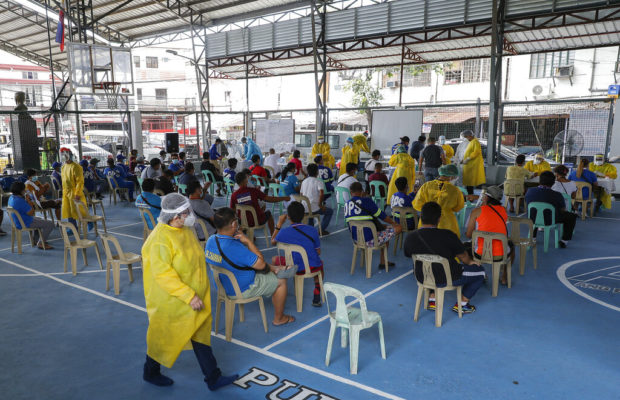MANILA, Philippines — The House minority bloc on Tuesday pushed for mass testing for the coronavirus with focus on health-care workers and others in the front lines, including those in media, to prevent a second wave of the contagion as the country moved to the “new normal” and relaxed quarantine protocols by mid-May.
Minority Leader Bienvenido Abante Jr. said his group supported the “Crushing COVID Act” proposed by Iloilo Rep. Janette Garin, a former health secretary, which would expand the testing to include individuals who have symptoms of COVID-19 or not.
House Bill No. 6707 will also create the “COVID Testing Assistance Fund (CTAF)” to subsidize testing of people belonging to priority and vulnerable sectors, including food handlers, supermarket and public market vendors, house helpers, pregnant women, and workers at salons, factories and construction sites.
The subsidy could range from P1,700 to P1,800 per test, Garin said.
Gov’t’s job
“As we shift to the new normal, it is time that we expand the testing that the public demands and needs. As we all return to work, it is the government’s job to ensure the safety of everyone,” she said in a privilege speech on Monday.
Due to its limited capability, the current testing protocol of the Department of Health (DOH) is only for those who show symptoms, Garin noted.
“[While] people gradually enter the new normal, equipped with the knowledge of personal hygiene and physical distancing, the fact remains that the unaccounted percentage of the population that is asymptomatic will definitely trigger a second wave of infections,” Garin said.
Abante said many doctors and medical experts had said that “if we want to succeed in the fight against COVID-19, we need to TEST, TEST, TEST.”
“As the title of this bill suggests, we believe that ending the COVID-19 outbreak is contingent on comprehensive testing, especially of the most vulnerable sectors in our country,” Abante said.
Cutting party lines
The House leader called on his colleagues to cross party lines to enact Garin’s bill.
“The only thing that matters is saving lives; we know the economy is important and we know people have to work, but keeping our people safe from the virus is the only way we will be able to open our economy and get back to work,” the Manila lawmaker said.
“There is no majority or minority in the middle of a crisis. There is neither administration nor opposition. We all want to help,” he said.The DOH is constantly upgrading its capacity to conduct more tests daily and is confident it could do up to 30,000 per day by May 30, according to Health Undersecretary Maria Rosario Vergeire.
The DOH completed more than 8,000 tests in one on Sunday, a target it had missed by 10 days.
To achieve its goal, Vergeire said the DOH was maximizing the testing capacity of the certified laboratories, engaging their private sector partners and using other means to test for SARS-CoV-2, the virus that causes COVID-19, such as making use of the GeneXpert machines that are available nationwide.
“We will achieve our goal of 30,000 tests per day by May 30 through [these] strategies,” Vergeire said.
“We continue to improve our testing capacity to ensure that all Filipinos have access to COVID-19 testing as needed,” she added.
Testing backlog
As of Tuesday, 181,668 tests have been done on 166,473 individuals since February. But the DOH has a backlog of 3,894.
Vergeire explained that testing was hampered by, among others, maintenance work on the laboratory equipment, the scaling down of operations of some laboratories, and the need for some personnel to go on quarantine due to possible infection.
One solution is the mass hiring of encoders. Vergeire had described encoding data as a “tedious” part of the testing process.
On Tuesday, the DOH reported 264 new COVID-19 cases, raising the number to 11,350 cases nationwide. Of the 264, 165 were from Metro Manila and 74, from Central Visayas.
With the addition of 107 more, the number of patients who had recovered climbed to 2,106. The death toll rose to 751 with 25 more who died.
The DOH said 2,067 health-care workers had contracted the virus, including 643 who recovered and 35 who died.
It has hired 1,187 medical front-liners to augment the health workforce.
Surge in cases
As the country eases the lockdown measures this weekend, except in Metro Manila, Laguna and Cebu City, Vergeire reminded the public to remain vigilant and maintain health protocols. She said that a surge in cases followed easing of restrictions were observed other countries.
“We saw this in South Korea, Japan, China and Singapore. We assure that the government is doing its best to be better prepared and enhance its efforts in testing, isolation, hospital capacity, equipment and manpower in the event that we find ourselves in a similar situation,” she said.
Until a vaccine against COVID-19 is found, everyone remains to be at risk of getting infected, Vergeire said.
“This is the reality of ‘World War C.’ If we do not take precautions, the enhanced community quarantine or lockdown may again be implemented,” she said.
She added that preventive measures like physical distancing, the wearing of masks, frequent handwashing and observing proper cough etiquette remain “effective” against the virus.
For more news about the novel coronavirus click here.
What you need to know about Coronavirus.
For more information on COVID-19, call the DOH Hotline: (02) 86517800 local 1149/1150.
